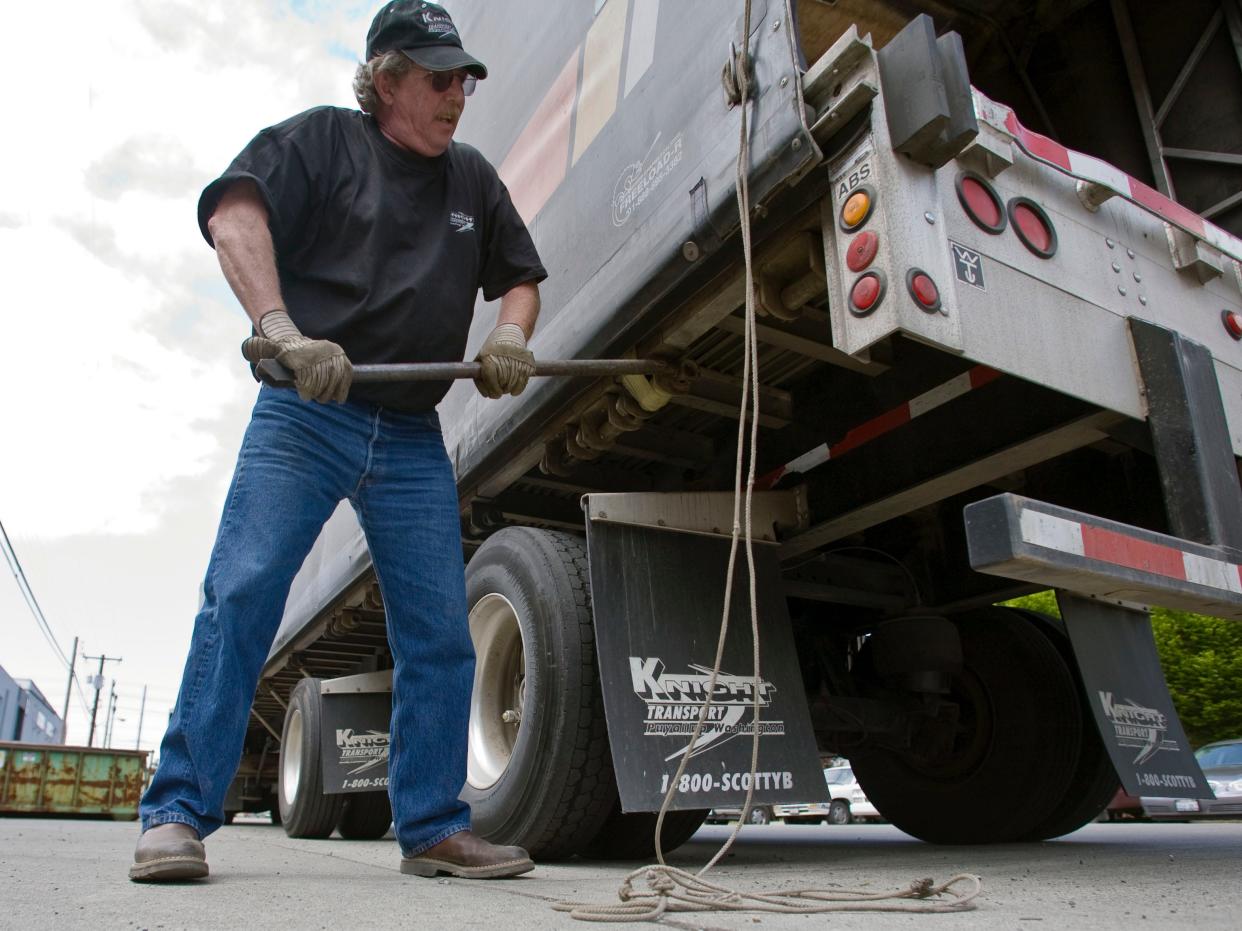A trucking giant quietly agreed to shell out $28 million to its truck drivers — and it could be a 'wake-up call' on how the industry pays them

AP Photo/John Froschauer
A Missouri-based trucking giant is settling two class-action suits with its truck drivers, offering $28 million.
One of the cases against New Prime, Inc. went all the way to the Supreme Court.
Experts say the case and its settlement could set a precedent for truck drivers who say their companies aren't paying fair wages.
Truck drivers at companies like Walmart and PAM Transport have recently sued for the right to be paid for every hour on the road.
After a years-long court battle that went all the way to the Supreme Court, a Missouri-based trucking giant is settling two class-action suits with its truck drivers, according to a court filing from July 20.
Up to 26,000 current and former drivers are eligible for a $28 million payout from New Prime, Inc., typically called Prime.
Both of the class-action suits — Oliveira v. New Prime and Haworth v. New Prime — involved truck drivers for Prime who claimed that they were not fairly paid. Truck driver Dominic Oliveira's case went all the way to the Supreme Court, which unanimously sided with Oliveira's claim.
Related: How truck escape ramps are used on steep roads
"We are proud of how we treat all of our associates, and we work hard to get it right," general counsel Steve Crawford wrote in an email to Business Insider. "Nevertheless, we decided that moving past this litigation was the right thing to do."
The core issue in both cases stemmed from a decades-old practice in the trucking industry in which drivers are paid per-mile, not hourly or annually. Oliveira argued that he deserved to be paid at least minimum wage.
Truck drivers spend weeks on the road for work and hours every day doing non-driving work tasks. In a 2016 study, almost 63% of truck drivers said they waited at least three hours every time they were at a shipping dock. This waiting time typically goes unpaid.
According to the US Department of Labor, "Any work which an employee is required to perform while traveling must, of course, be counted as hours worked."
An emerging trend in favor of the truck drivers
Experts say the case and its massive settlement could set a precedent for truck drivers who say their companies aren't paying fair wages. Cathy Roberson, president of research firm Logistics Trends & Insights, said this may create a path for truck drivers who have documented evidence of unpaid work to fight for back pay in court.
"It could tip the scale in favor of the driver," Roberson told Business Insider. "For those that do potentially launch action against a trucking firm, a precedent has been set already and they could refer to this."
She added, "In a way, it's almost like a wakeup call."
America's $800 billion trucking industry relies on owner-operators, who own their trucks and may be contracted with certain companies. About 350,000 to 400,000 of the nation's 1.9 million truck drivers are owner-operators.
Like most trucking companies, Prime classifies its owner-operators as contractors — and are therefore not privy to certain worker protections. The Supreme Court ruled in its unanimous opinion last year that Prime's owner-operators were indeed employees and entitled to the federal minimum wage of $7.25 per hour.
"Considering the continuing efforts of mega-carriers to thwart the rights of drivers, the decision is an important one for protecting the rights of interstate drivers to have their claims heard publicly and in a collective fashion," Justin Swidler, an employment law attorney who often represents truck drivers, told Business Insider following the Supreme Court ruling.
Crawford of Prime said the company believes its business model is "completely lawful."
The court case "primarily dealt with a challenge to the independent contractor business model for truckers," Crawford wrote in an email.
"The independent contractor has been a long standing piece of our company and trucking in America," Crawford said. "We believe that our business model is completely lawful and compliant with all regulations while providing drivers the opportunity to earn, based on their own efficiency and productivity, excellent compensation."
It's the latest in a set of legal action that pushes the boundaries on a question recently haunting America's courts in recent years: whether truck drivers deserve minimum wage for non-driving duties.
A federal court in California told Walmart that it owes its California truck drivers $54.6 million in January 2020. The opinion said Walmart violated the law when it didn't pay truck drivers for rest breaks and other non-driving time.
In October 2018, a federal court in Arkansas decided in a class-action suit that drivers should be paid for every hour truckers spend in their trucks while not sleeping — 16 hours a day of at least minimum-wage pay.
In 2017, a Nebraska court decided that trucking giant Werner Enterprises must pay $780,000 to 52,000 student truck drivers after being accused of pay-practice violations. Another major carrier, C.R. England, paid $2.35 million in back wages to more than 6,000 drivers in 2016.
Read the original article on Business Insider

